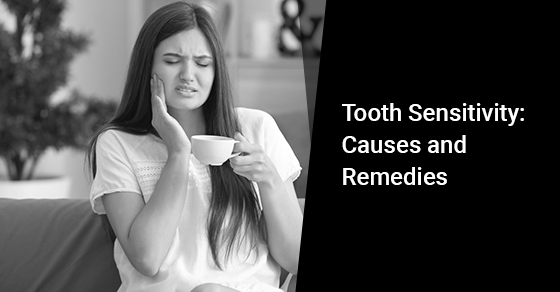
Are you suffering from pain caused by having sensitive teeth? When you take a sip of your coffee in the morning, do you feel discomfort? Or, does it hurt when you brush or floss?
If so, these are some of the initial signs that you might have sensitive teeth. Sensitive teeth can be caused by any number of factors, such as your genetics, toothy decay, a fractured tooth, gum disease, having an exposed tooth root, and more.
At Oakville Place Dental Office, we are committed to protecting your oral health and taking care of any pain you might have. If you need a dentist to help support your needs, our team of qualified dental experts can offer you a wide range of services from teeth whitening and cleanings to dental implants or even Invisaligns.
Teeth can become sensitive once the enamel, which is the top protective layer of the tooth, becomes worn down. When the enamel wears down, it exposes the dentin underneath, which can cause it to become more permeable. This means that it will let liquids and gasses pass through more easily.
Underneath your dentin, there is something called the dental pulp that has many nerve endings and blood vessels. When things pass through the dentin, they are able to reach these nerve endings; if that happens, the person can experience pain. Consuming hot or cold things and chewing can also trigger pain.
Here are some common causes that can wear down enamel and cause tooth sensitivity:
If you’re looking for ways to relieve your tooth sensitivity from the comfort of your own home, then here are some remedies that you can try:
Using a toothpaste made from sensitive teeth can help, as it is designed with special ingredients like fluoride to help protect your enamel and to reduce sensitivity if used regularly. Cleaning your teeth with products that contain fluoride can also reduce risks of getting cavities.
Oil pulling refers to the practice of swishing oil in your mouth for a few minutes and then spitting it out. You can use either sesame or coconut oil to do this. Oil pulling is a traditional Ayurvedic practice that originates from India. Studies show that oil pulling with sesame oil could prevent or reduce symptoms of gum disease. In turn, it may also lessen tooth sensitivity by thoroughly cleaning off any harmful bacteria from the surface of your teeth.
Rinsing your mouth with saltwater is another good way to get rid of bacteria and improve your overall oral hygiene. Some studies have shown that a saltwater rinse is as effective at cleaning your mouth as mouthwash. To make a saltwater rinse, add half a teaspoon of salt to 8 ounces of warm water. Then, swish it in your mouth a few times before spitting it out.
You might be familiar with using turmeric in your cooking, but it can also be used as a remedy to reduce sensitivity in teeth. It is often used in Ayurvedic medicine to lessen inflammation. Turmeric contains something called curcumin, which can also help with relieving pain. You can make a turmeric paste using turmeric and water mixed together. Then, rub the solution onto your gums to help reduce pain and sensitivity.
You can find oral products with desensitizing agents in them, like toothpaste, which help make dentin less permeable. Dentin is the hard tissue that is beneath the layer of enamel in the teeth. When your dentin is less permeable, it is more difficult for liquids to pass through, thus protecting the nerves underneath and decreasing tooth sensitivity.
Capsaicin is what gives chili peppers their natural spice. So, if you like to eat spicy foods, then you could try using it to help alleviate tooth pain. Applying capsaicin topically can help relieve certain types of pain. In fact, scientists believe that it might numb your nerves, thus causing them to deliver less pain signals to your brain.
Some examples of desensitizing dental agents include metal ions, potassium, and oxalates.
Individuals can help protect their enamel and prevent sensitive teeth by:
Dealing with tooth sensitivity can be challenging and frustrating, but you don’t have to handle it on your own. You can rely on the help of professionals to help you diagnose the problem and to get the right treatment. You’ve made a great decision to begin learning more about tooth sensitivity. Anytime is a great time to start taking extra care of your teeth so that you can avoid difficulties in the future and you can confront sensitivity by sticking with a proper oral hygiene routine.
To learn more about dentistry services in Oakville, contact Oakville Place Dental Office today and our team of experts can help you with your tooth sensitivity or with any other emergency dental issue that you might be experiencing. Call us at 905-842-6030 or contact us here.
 0 Comment
0 Comment